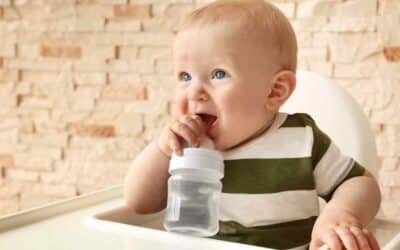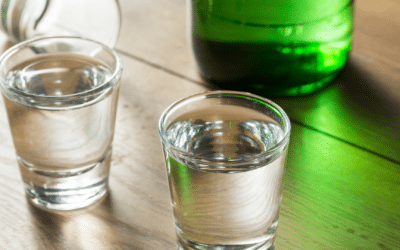Water is a fundamental element of life, and when it comes to our precious little ones, ensuring they get the purest form is paramount. The journey of discovering how to choose the best distilled water for babies can be overwhelming for new parents, given the plethora of options available. This article aims to shed light on the importance of distilled water for infants and guide you through the process of selecting the best distilled water. Navigating the world of infant care can be daunting, but with the right information, choosing water for babies doesn’t have to be a challenging task. Dive in to ensure your baby’s hydration needs are met with the utmost purity and care.
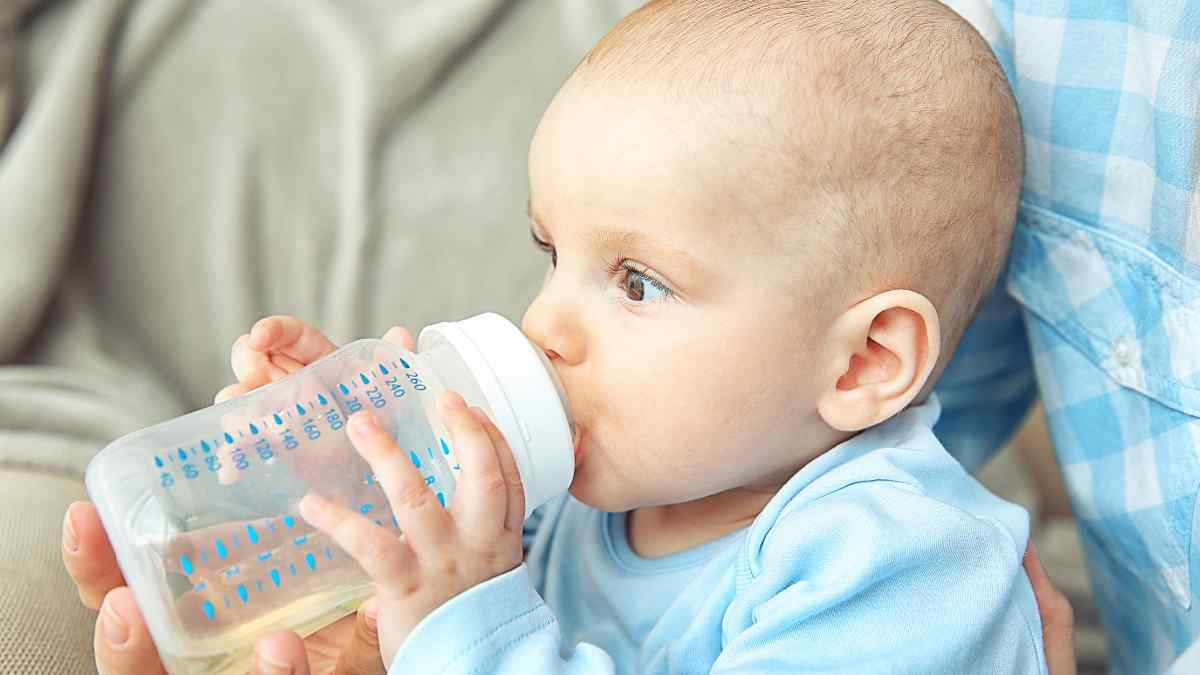
Why Distilled Water for Babies
Understanding the Distillation Process
- The Science Behind Distillation: At its core, the distillation process involves boiling water to produce steam and then cooling that steam back into liquid form in a separate chamber. This process ensures that most of the impurities, contaminants, and minerals are left behind.
- Benefits of Distillation: Distilled water is considered soft, with minerals removed. It’s free from harmful chemicals, lead, chlorine, and other contaminants that can be present in tap water. This makes distilled water good for mixing baby formula, ensuring that the water your baby drinks is as pure as possible.
Comparing Water Sources
- Tap Water vs. Distilled: While tap water is treated and is generally safe for adults, it can contain fluoridated water, extra minerals, and even traces of contaminants. Boiling tap water, or bringing it to a rolling boil, does kill bacteria, but it doesn’t remove added fluoride or other minerals. Boiled tap water can still contain too much fluoride, which can lead to faint white lines on baby’s teeth.
- Bottled Water, Nursery Water, and Other Purified Waters: Bottled water and nursery water might seem like good options, but they can still contain additional fluoride or extra minerals. Some purified water systems use processes like reverse osmosis to purify, but the mineral content can vary. It’s essential to read labels and ensure the water is considered soft and is free from added fluoride.
- Well and Spring Water: Both well water and spring water can be rich in minerals. Well water, in particular, can be at risk for bacterial contamination, making it a less ideal choice for mixing formula unless it’s tested regularly.
The Importance of Purity in Infant Feeding
- Formula Feeding Concerns: When formula feeding, especially with powdered formula, it’s crucial to use water that’s free from contaminants. Water for baby formula needs to be clean, and using distilled water ensures that you’re not adding extra fluoride or other unwanted minerals to your baby’s diet.
- Risks of Too Much Fluoride: Excessive fluoride can lead to dental fluorosis, causing faint white lines or streaks on a child’s teeth. While fluoridated supplements might be prescribed for older children, infants, especially those born prematurely, shouldn’t be exposed to too much of it.
- Avoiding Bacterial Infections: Using boiled tap water or distilled water to prepare infant formula ensures that any harmful bacteria are eliminated. This is especially crucial for infants whose immune systems are still developing.
- Water Intoxication: It’s essential to note that while water is necessary for mixing with formula, giving too much water alone to an infant can lead to water intoxication. Always consult with a pediatrician about how much water is the best for your child.
Factors to Consider When Choosing Distilled Water for Your Baby
After understanding the significance of distilled water for babies and the various sources of water available, it’s essential to delve deeper into the factors you should consider when choosing the best water for your baby. Here are some critical elements to keep in mind:
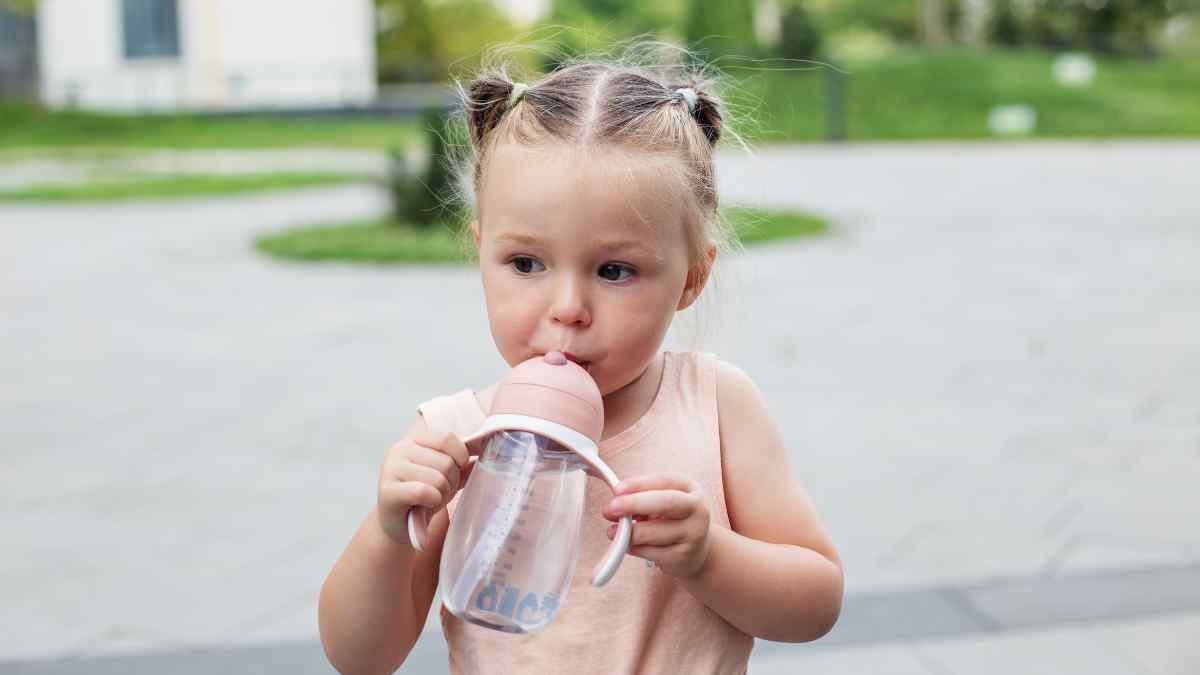
Purity Level
- Absence of Impurities: The primary reason many parents opt for distilled water for babies is its high purity level. This water is free from chemicals, minerals, and other contaminants, making it one of the best water options for mixing with baby formula.
- Reading Labels: It’s of utmost importance to read labels when choosing water for your child. Labels can give insights into the purification process, ensuring that the water for baby formula is as pure as possible. Not all bottled water is created equal, so being an educated consumer is crucial.
Source of Water
- Understanding the Origin: The source of the water can significantly impact its purity. Whether it’s from a spring, well, or municipal source, it’s vital to know where your water comes from.
- Relevance to Purity: Water sourced from wells or springs can have a higher mineral content, potentially leading to bacterial infection risks. In contrast, distilled water, having gone through a rigorous purification process, is perfectly safe and ideal for making formula.
Packaging
- BPA-Free and Eco-friendly Bottles: The packaging can play a role in water quality. BPA-free bottles ensure that harmful chemicals don’t leach into the water, and eco-friendly packaging is better for the environment.
- Storage and Water Quality: How water is stored can affect its quality. It’s best to store water in a cool place, away from direct sunlight, to maintain its purity.
Expiration Date
Shelf Life: While water doesn’t “expire” in the traditional sense, distilled water can absorb carbon dioxide from the air over time, slightly altering its taste and pH. It’s essential to check and adhere to expiration dates to ensure the water’s quality.
Safety First: Using water past its expiration date for baby’s formula might not be harmful, but it’s always best to use fresh water to ensure the best water quality for your child.
Brand Reputation
Research and Choose Wisely: Not all brands are created equal. Researching and choosing brands known for providing the best distilled water for babies is essential.
Reviews and Recommendations: The experiences of other parents can be invaluable. Reading reviews and getting recommendations can help you make an informed decision about the water you’re using for mixing formula.
Potential Risks of Using Non-Distilled Water
Having delved into the factors to consider when choosing distilled water for your baby, it’s equally important to understand the potential risks associated with using non-distilled water. As parents, we naturally want the best for our children, and being informed about the risks of certain water sources can help ensure their safety and well-being.
Harmful Minerals and Contaminants in Tap Water
- Presence of Impurities: While tap water undergoes treatment to make it safe for drinking, it can still contain a range of impurities. These might include magnesium, lead, and other minerals that are not ideal for a baby’s developing system.
- Chemicals and Contaminants: In addition to natural minerals, tap water can also contain traces of chemicals used during the purification process. While these chemicals are generally considered safe for adults, they might not be ideal for babies, especially when used for mixing with baby formula.
Risks of Well and Spring Water
- Natural but Not Necessarily Safe: While well and spring water are natural sources, they are not always the safest option for babies. These water sources can be rich in minerals and might contain contaminants that aren’t found in best distilled water for babies.
- Bacterial Contamination: One of the most significant risks of using well water, in particular, is the potential for bacterial contamination. Without proper treatment or purification, well water can pose a risk of bacterial infections, which can be particularly harmful to infants.
- Necessity of Purification: If parents choose to use spring or well water, it’s crucial to ensure it undergoes rigorous purification, including filtering and boiling. Bringing the water to a boil for at least one minute can help eliminate harmful bacteria.
Health Implications of Impure Water
- Digestive Issues: Babies have delicate digestive systems, and impure water can lead to stomach upsets or more severe digestive problems.
- Lead Exposure: Some old water systems or pipes can lead to lead exposure, which can have severe health implications for babies.
- Disease Control: Using impure water can expose babies to diseases. This is why organizations emphasizing disease control always recommend purified or boiled water for babies.
- Fluoride Overexposure: While fluoride can be beneficial in small amounts, overexposure, especially from tap water used in baby’s formula, can lead to dental issues in infants.
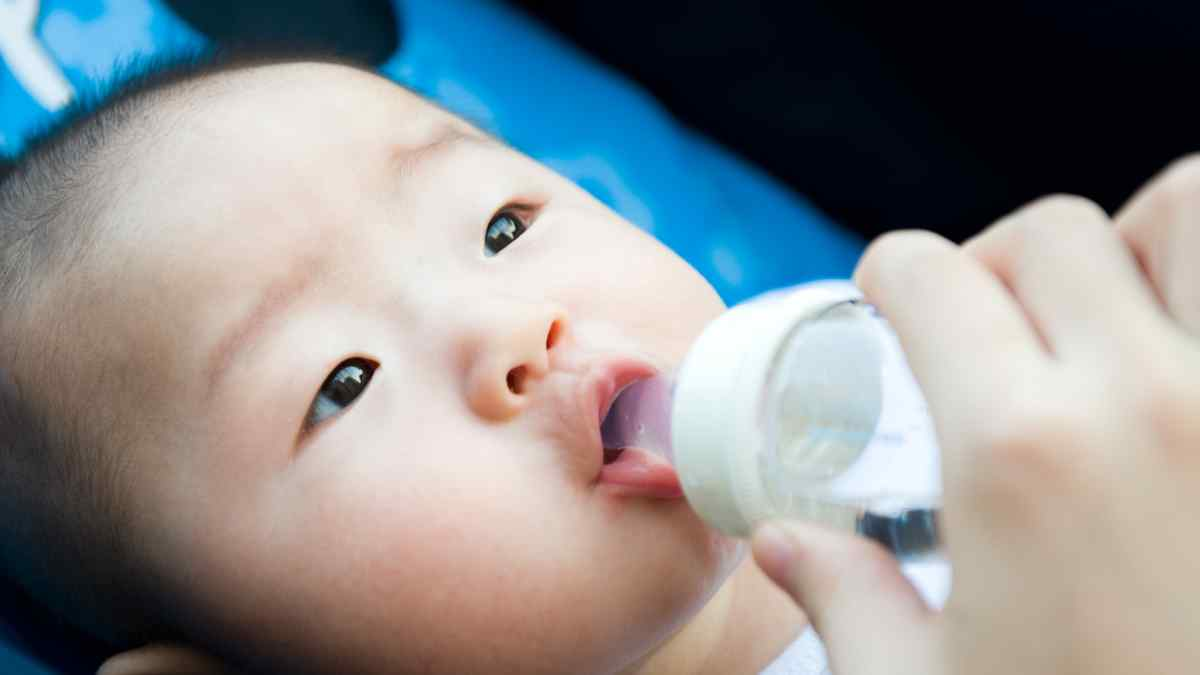
Distilled Water in Baby Products
While we’ve previously discussed the importance of water purity and the risks of non-distilled water, another key aspect to delve into is the role of distilled water in various baby products. The use of distilled water extends beyond just formula preparation; it plays a pivotal role in other aspects of infant care as well. Let’s explore some of these areas.
Distilled Water in Baby Formula
- Formula Preparation: When preparing baby formula, using distilled water can ensure that the water mixed with the powdered infant formula is free from contaminants. This is especially important given the delicate nature of a baby’s digestive system.
- Consistency in Quality: By consistently choosing water for infants that is distilled, parents can ensure a constant quality, devoid of the fluctuations that might occur in sources like tap or well water.
- Avoiding Overexposure: As previously mentioned, certain elements like fluoride, when present in excess in water sources, can have implications for babies. Using distilled water for baby formula helps in avoiding such overexposure.
Importance in Humidifiers
- Cleaner Air: Many parents use humidifiers in their baby’s room to maintain optimal humidity levels. Using distilled water in these humidifiers prevents the dispersal of minerals into the air, ensuring the baby breathes cleaner air.
- Longer Appliance Life: Distilled water, being mineral-free, also prolongs the life of humidifiers, preventing mineral build-up that can hamper the appliance’s efficiency over time.
- Avoiding Bacterial Growth: Distilled water’s purity ensures that the chances of bacterial growth in humidifiers are minimized, promoting a healthier environment for the infant.
Other Beneficial Baby Care Products
- Baby Wipes: Some baby wipes manufacturers use distilled water to ensure the wipes are gentle and free from impurities that might irritate a baby’s sensitive skin.
- Cooling Products: Products meant to soothe or cool, like certain teething rings, might use distilled water as their primary content. This ensures that if there’s any leakage, the baby isn’t exposed to impure water.
- Cleaning Products: Distilled water can also be beneficial in products used to clean baby toys or feeding equipment, ensuring that residues left behind are minimal and safe.
Cost vs. Quality
Following our exploration into the role of distilled water in various baby products, it’s clear that this purified liquid plays a crucial role in infant care. However, as with most products, there’s a balance to strike between cost and quality. Let’s delve into understanding this balance and how parents can make informed decisions without compromising their baby’s health or their budget.
Understanding the Price Range
- Variability in Costs: The market for distilled water offers a broad price range. Factors affecting the cost include the brand, source of water, purification process, and packaging.
- Premium Brands: Some brands might charge a premium based on their reputation or specific purification methods. It’s essential to understand what you’re paying for and if it translates to tangible benefits for your baby.
Balancing Cost with Health Benefits
- Prioritizing Purity: While there are various options available when choosing water for infants, the purity of the water should always be the top priority. Remember, you’re not just paying for water, but for the assurance that it’s free from contaminants.
- Long-term Health Implications: Using the best distilled water for babies can have long-term health benefits, reducing the risk of exposure to harmful minerals and chemicals. While it might seem costlier upfront, the health benefits and potential savings on future medical bills can make it a worthwhile investment.
Tips on Finding Quality Without Breaking the Bank
- Bulk Purchases: Often, buying in bulk can lead to cost savings. Look for deals or discounts when purchasing larger quantities of distilled water.
- Research and Reviews: Leveraging educational content and reviews from other parents can help you find brands that offer high-quality distilled water at reasonable prices.
- Local Suppliers: Sometimes, local suppliers or smaller brands offer high-quality distilled water at competitive prices. It’s worth exploring local options and comparing them to more prominent brands.
- Reusable Containers: Some stores offer distilled water in refill stations, allowing you to bring your reusable containers. This can be both cost-effective and environmentally friendly.
- Water Filters: Investing in a good water filter for home use can be an alternative. While it may not produce strictly distilled water, certain filters can get close in terms of purity and can be cost-effective in the long run.
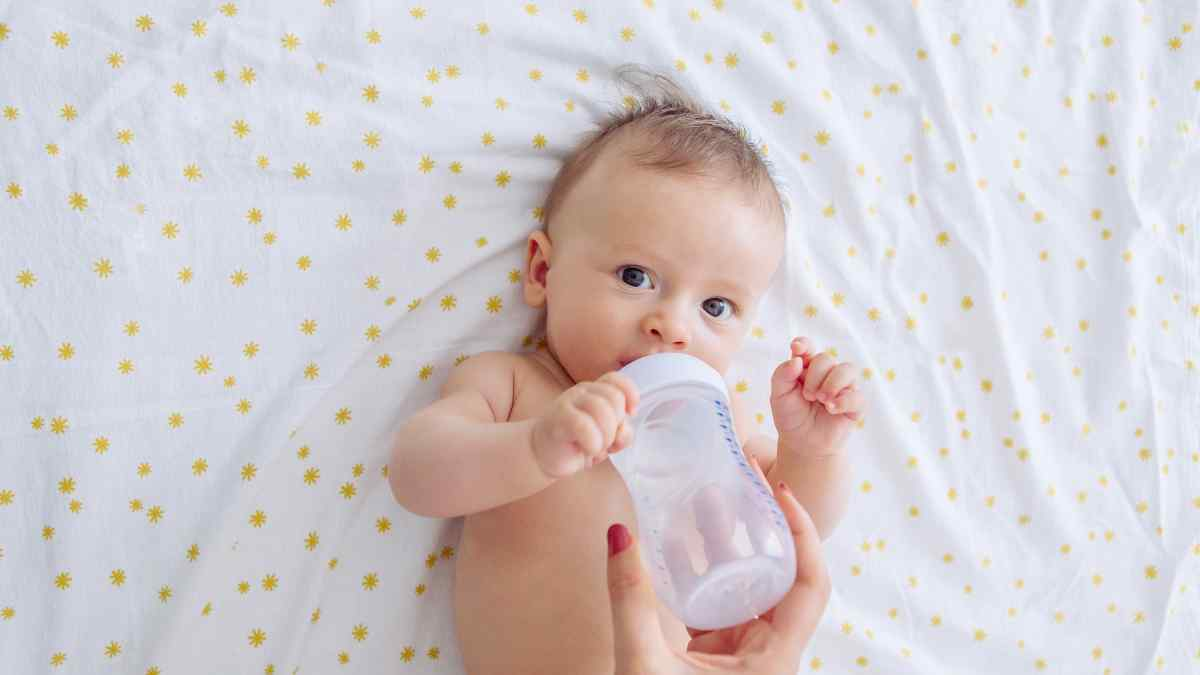
Conclusion
Water is the essence of life, and for our little ones, ensuring its utmost purity is not just a choice but a responsibility. As we’ve journeyed through this article, we’ve delved deep into understanding the significance of distilled water, its purification processes, benefits, and the crucial role it plays in various baby products. From preparing baby formula to humidifying their environment, the use of distilled water has proven to be indispensable.
But like many things in the parenting realm, finding the best distilled water for babies is not just about purity. It’s about balancing quality with cost, understanding the myriad of options available, and making informed decisions that prioritize our baby’s health without compromising our budget. As we’ve learned, while there are premium options available, there are also economical ways to ensure our baby gets the best, whether through bulk purchases, research, or even investing in water purification at home.
In conclusion, choosing water for infants is a task that requires thought, research, and understanding. But with the right information at your fingertips, it doesn’t have to be daunting. As parents, our goal is to provide the best for our children, and with this comprehensive guide on how to choose the best distilled water, you are well-equipped to make a choice that ensures your baby’s hydration needs are met with purity, care, and love.
Did this article help you? Please leave a comment below. If you have any questions, don’t hesitate to ask.

